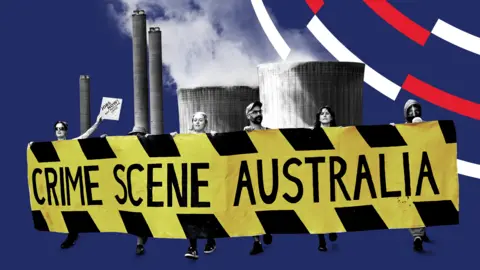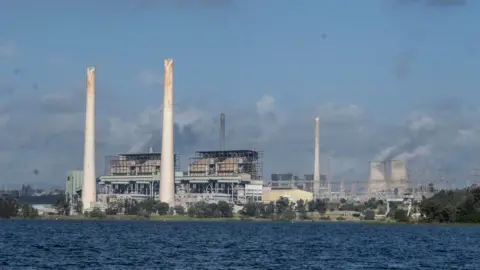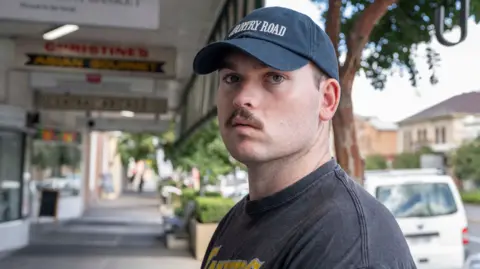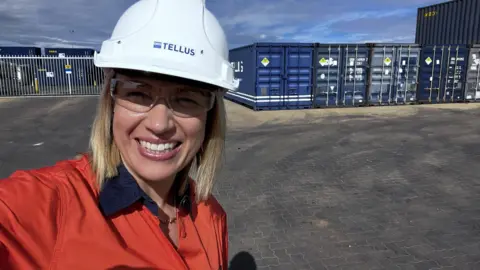[ad_1]
 BBC
BBCIn the Hunter Valley, long, brown trains chug through lush pastures, carrying stacks of black rock – the lifeblood of the region, though not for much longer.
This has long been Australia’s coal country. But the area, a three-hour drive from Sydney, is now begrudgingly on the frontline of the country’s transition to clean energy.
“This town was built around a coal mine,” says Hugh Collins from Muswellbrook, “so it’ll be a big shift. I don’t know what will happen.”
Nowhere captures this dilemma quite like the soon-to-be demolished smokestacks of Liddell power station, which tower over the rolling hillside nearby. Liddell, one of Australia’s oldest coal plants, was closed two years ago. Across the highway is sister-power station Bayswater, scheduled for retirement by 2033.
Liddell’s owners want to redevelop both stations into a renewable energy hub – in line with the Labor government’s plans for a grid powered almost completely by solar and wind energy.
The opposition Liberal-National coalition, though, has proposed converting Liddell into one of seven nuclear power plants across the country. Currently banned, nuclear is the controversial centrepiece of the Coalition’s clean energy plan.
 BBC/Mridula Amin
BBC/Mridula AminNuclear has historically been deeply unpopular among Australians scared of having radioactive plants in their metaphorical backyards. But with the Coalition plugging it as a cheap and reliable option to complement renewables, interest is growing.
Ahead of the election on 3 May, each party has insisted that their visions are the best way to both fulfil Australia’s commitment to net zero emissions by 2050 and tame rising power bills.
But there are fears this renewed debate over Australia’s energy future takes the country back to the past.
Brutal arguments over climate change had plagued Australian politics for years – but the incoming Labor government last election declared that era was over.
Now experts worry the so-called “climate wars” are back, and this could potentially delay the urgent emissions reduction the globe has been begging the country to take for years.
“I don’t think peace will be declared no matter what happens with the election,” says Tony Wood from the Grattan Institute think tank.
Small town, big debate
It is hard to overstate just how central coal has been to the Hunter region.
In 1799, Newcastle, the area’s biggest city, farewelled Australia’s first commodity export – a shipment of coal. Today it is home to the world’s largest coal port, with A$38.6bn-worth ($26.8bn; £18.9bn) passing through in 2023.
The livelihoods of about 52,000 people here rely on coal mines, power stations or supporting industries.
Made up of a handful of parliamentary seats, the region has traditionally been a Labor stronghold. But in recent years electorates like Hunter and Paterson have been faltering, and the Coalition is banking on its vision of a nuclear-powered future to win over these largely blue-collar constituents.
It says it can have the first nuclear plant up and running by 2037 and that nuclear plants will provide a similar number and range of jobs as the coal-fired power stations they’re going to supersede.
“I think in the Hunter, and elsewhere to be honest, people realise that if there is not a replacement industry for coal, then these jobs go,” opposition leader Peter Dutton said on the campaign trail.
While nuclear power has been part of the energy mix in many countries around the globe for decades, this is uncharted territory for Australia.
The country’s only nuclear reactor, at Lucas Heights in Sydney, is used for medical research.
Nuclear has been banned at a federal level since the late 1990s. If the Coalition wins the election, it could convince parliament to overturn that, but persuading states to scrap their own bans on nuclear may not be so simple. Leaders in four of the five states where nuclear plants are proposed have outright ruled out doing so.
Critics also say the Coalition’s claims on timeframe and its $300bn price tag are unrealistic given the need to train workers, develop regulations and build the infrastructure. Some have accused it of simply trying to prolong the use of fossil fuels – the ageing coal plants will have to run for longer to plug the energy gap.
From Mr Collins’ perspective, that wouldn’t be so bad. “Being in the coal industry, I would like coal to go as long as possible,” he says.
 BBC/Mridula Amin
BBC/Mridula AminBut he understands the need to “embrace” cleaner sources of energy. Though a variety of sources “all have their place”, he is particularly interested in nuclear.
“There [may have been] a lot of scary notions around nuclear power… but technology has come a long way,” he says, referring to deadly disasters like Chernobyl in 1986 and Fukushima in 2011.
But others in Muswellbrook are adamant the need for employment in the region does not outweigh the “risks” of nuclear.
“Liddell’s closure meant a few jobs were lost but I don’t think that really affected the community… I think [nuclear] is dangerous,” says 25-year-old Chloe.
Another cafe owner simply says “it’s not going to happen”.
“We don’t have the technology to build it. We can’t afford it,” he says. “We’re always going to have to burn coal, I believe.”
The topic clearly evokes strong feelings. Many people here are more than happy to share their opinions with the BBC, but are hesitant to be named or photographed. “Our community group is ruthless,” one woman explains.
But elsewhere in the Hunter region, it is Labor’s renewables plan that is stirring heated conversation.
Renewables currently supply 46% of Australia’s electricity and Labor wants to raise the proportion to 82% by 2030. As weather is unpredictable, this plan must be backed up by batteries and gas, it argues.
“Australia needs to be ambitious. We must be optimistic… We can be a renewable energy superpower for the world,” Prime Minister Anthony Albanese said last month, adding that this vision will create jobs in “every part of the country”.
Ben Abbott is one of those unconvinced by these plans.
 BBC News/Mridula Amin
BBC News/Mridula Amin“We are not experts in energy. But where we will put our hat into the ring is when it concerns where we live. We know what’s at stake,” said Mr Abbott, who is president of No Offshore Turbines Port Stephens.
The government has earmarked a 1,854 sq m (20,000 sq ft) area between Newcastle and Port Stephens – a popular spot for whale watching and game fishing – as Australia’s second offshore wind zone.
Mr Abbott’s group is concerned that the construction and operation of wind turbines will disturb marine life – though scientists say more research is needed – and adversely affect tourism.
He also accused Labor of running a “scare campaign” against nuclear.
Some in the party have savaged the opposition’s nuclear pitch by flooding social media with, among other things, memes featuring beloved cartoon koala Blinky Bill with three eyes.
“I’d like to learn more about it from an impartial point of view, not as a political issue,” Mr Abbott says.
 BBC/Mridula Amin
BBC/Mridula AminOn the other hand, some have also accused the Coalition of capitalising on fear around wind farms. Billboards along the highway to Port Stephens profess that only their local candidate will “stop Labor’s offshore wind farms”.
There is also concern that local anti-renewables movements are being driven or backed by people who outright reject climate change, as a tactic to delay the country’s turn away from fossil fuels. According to Guardian Australia, that includes the Saltbush Club, a group of the country’s most prominent and powerful climate change deniers.
Mr Abbott says the Port Stephens campaign is not one of these. “None of us are against renewables,” he says, noting that he agrees with the commitment to net zero.
The conversations taking place in the Hunter region are playing out on a national level too.
Polls indicate the country is still split on the best path forward, with support for nuclear hovering around 40%, with the rest fluctuating between undecided or opposed.
For every argument from each side of the debate, there’s a point to counter it on the other.
Both parties have been flouting the jobs created for communities hosting their energy infrastructure, but have been using cost-of-living relief to appeal to the nation more broadly.
However the price tag on each of these plans depends on who you ask.
Labor has for years said a grid dominated by renewables would cost A$122bn, and has dangled energy bill rebates and discounts on solar home batteries as part of its pitch.
But the Coalition says they believe it will cost at least five times more, and that their plan is half the price. They too have promised lower power bills with nuclear.
Australia’s national science agency, though, says they estimate electricity generated from nuclear reactors will cost twice as much as renewable energy, even after accounting for their longer lifespans.
 Jasmin Diab
Jasmin DiabEnvironmental economics professor Frank Jotzo argues that the Coalition’s promises can only be put to test a long time in the future. “Given that Australia runs on three-year terms of government, they will not be under pressure to deliver,” he says.
Grattan Institute’s Mr Wood believes the Coalition is wielding nuclear energy as a political weapon, noting that Australia has for at least the last decade seen bipartisan support for renewables.
“They needed a point of difference. And nuclear met the objective,” he says.
Both note the Coalition has already signalled it could abandon Australia’s 2030 emissions reduction target if it wins government – while Labor says it is on track to meet it.
“A Coalition government, majority or minority, would have very big challenges introducing the nuclear proposal. I suspect we would see an escalation in the climate war,” Mr Wood said.
But nuclear advocates are frustrated nuclear power isn’t even an option here.
While Australia has abundant solar and wind resources, these are intermittent, says nuclear engineer Jasmin Diab. Nuclear is more reliable and facilities last twice as long – so she argues an “ideal energy mix” would be heavy on renewables with a “backbone built on nuclear”.
“Labor’s position prevents Australia from making use of what’s going to be an important source of energy in the future,” said nuclear law expert Helen Cook. She points to countries across the world already benefiting from nuclear energy, such as the US and Canada, and several others at least studying it, including Indonesia.
 BBC/Mridula Amin
BBC/Mridula AminBut Justin Page, from the Hunter Jobs Alliance, argues the Hunter doesn’t have time to opt for the Coalition’s “fundamentally flawed” plan.
The region is well on the way in its transition to renewables, he says, with proposed wind projects, for example, expected to create some 3,000 jobs.
“To go nuclear will mean starting off the ground… Such a transition will take too long and be too costly,” he says. “It will be ridiculous to change courses now.”
Many Hunter residents say they just want certainty.
“The best plan will be for the two parties to get together and come up with a credible, realistic and deliverable plan… rather than using such a serious issue for electioneering,” one Newcastle resident tells us.

[ad_2]
Source link




